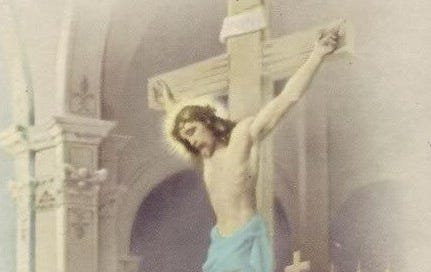Meditation for the Third Saturday after Pentecost, July 5, 2025: Zeal for Hearing or Saying Mass
Excerpt from the book Meditations for all the Days of the Year
Zeal for Hearing or Saying Mass
Preparation
We will meditate today on the motives for the zeal we ought always to feel for hearing or saying Holy Mass:
That of all religious exercises, it is the one which is most agreeable to the Most Holy Trinity.
That it is the one which is the most profitable for us and for the Church.
We will then make the resolutions:
Never to fail, in as far as is possible, either to say or to hear it every day.
To bring with us to it a lively faith and deep piety.
Our spiritual nosegay shall be the beautiful words of the Imitation of Christ: “When the priest celebrates he honors God, he gives joy to the angels, he edifies the Church, he succors the living and the dead, and he procures for himself all kinds of graces.” (IV. Imit. v. 3).
Let us adore Our Lord, the supreme High-Priest, consummating upon the altar, by the ministry of the priest, as well as upon the cross in His own person, the sacrifice which glorifies God and which saves the world. Let us thank Him for admitting all of us to participate in the merits of this solemn act. “Come to Me” (Matthew 11:28), He cries aloud to us; let us promise Him to respond to this amiable invitation with eagerness and love.
First Point
Holy Mass is, of all Religious Acts, the one which is the most Agreeable to the Most Holy Trinity.
It is to the Most Holy Trinity alone that the Holy Sacrifice can be offered, and what better acts could be offered to Him than the one which procures for Him infinite glory, which renders infinite thanksgiving for all His benefits, and which satisfies His justice by an infinite reparation? Now the sacrifice of the Mass unites these three great advantages, as we have shown in our preceding meditations; whence we ought to conclude that we can do nothing which is more agreeable to God than to assist at the Holy Sacrifice when we do not offer it, and to come and welcome His Son at the moment when He descends, from amidst the splendors of the saints, upon the altar, to offer Him our praises and our love, to unite our prayers with His, the sacrifice of ourselves with the sacrifice which He makes therein of His own person; and through Him to adore, to love, and to bless the Most Holy Trinity, to whom He offers Himself.
A great monarch who should send his son to visit his provinces would be offended by the negligence of those among his subjects who did not come and welcome his beloved son; and he would, on the contrary, be flattered by the eagerness with which his other subjects would come and welcome him and make the air resound with their exclamations of love and devotion. It is the same with the Holy Sacrifice; in the same degree in which the Most Holy Trinity beholds with displeasure the indifference which leaves almost alone in the church the celebrant with his humble server, it beholds with delight a numerous assemblage of the faithful collected together before the altar, praying and adoring with the priest.
Mary and John, at the foot of the cross, assisting at the death of the Savior on Calvary, were the objects of the complaisance of the Most Holy Trinity; they were the type of Christians assisting at the sacrifice of the Mass, since it is the same sacrifice on the altar that it was on Calvary. Let us hence learn to assist as often as possible at Holy Mass, and let us have a horror of those who do not assist at it when they might.
Second Point
The Holy Sacrifice is, of all Religious Acts, the one which is the most Profitable to us and to the Church.
1st — It is evident that no prayer, not even that of the whole of the angels, is to be compared in value to that of Jesus Christ immolating Himself upon the altar, and making all His wounds, as though they were so many supplicating voices, to pray for us. To neglect, by our absence through insufficient motives, so powerful a prayer, is to be our own enemy; it is to sin against our dearest interests.
2nd — To offer the Holy Sacrifice, or only to unite with the priest who offers it, assisting at it in the spirit and intention with which he offers it, is, as we have already seen, to procure joy for the Church triumphant, solace for the Church suffering, the most efficacious aid for the Church militant. Now, could there possibly be anything more profitable for the universal Church? For the sake of the love we bear to our brethren in heaven, ought we not to esteem ourselves happy to be able to help them to glorify and to thank the Lord? For the sake of the sufferings of the souls in purgatory, ought it not to be a joy to us to solace them by the Divine Sacrifice?
3rd — If we are alive to the woes of the Church militant, to the troubles of all kinds to which all the children of Adam are subjected, what happiness for us to come to their aid by this same sacrifice.
Oh, how these thoughts ought to make us assiduous in assisting at Holy Mass, as far as is possible to us. Have we this zeal in hearing and in piously assisting at it?
Meditations for All the Days of the Year, Vol. 3 by Reverend M. Hamon, S. S. (Benzinger Brothers, 1894, pages 304-308).



